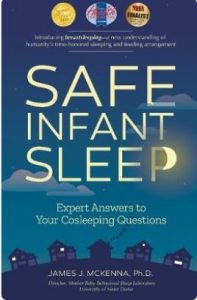I tried to nurse my husband’s elbow once. Groggy, desperately sleep-deprived, I heard my baby cry and fumbled in the bed for him, putting the nearest warm thing to my breast. But my son was down the hall, in his own crib, where we returned him aftermost nursings. That’s why I was sleep-deprived.
Our first routine was for my husband to get up each time the baby cried, and bring him to me to nurse (sitting up) on Side One. Then my husband would get up, take the baby to the bathroom, change his diaper, and return him to me to nurse (sitting up) on Side Two. Then my husband would get up and return the baby to the crib down the hall. Three trips out of bed each time those eight pounds of energy woke up. That lasted three nights.
But it took us two babies to get it completely right. Our second baby shared our bed from the start, with a rubber-and-flannel sheet under baby and mother to catch any drips from either one. There was an extra diaper handy at bedside until he stopped pooping at night, an extra nightgown or two until I stopped leaking, and a nightlight in the early days to help me line up my inexperienced partner of unaccustomed dimensions without either of us moving from our nest.
I nursed the “bottom breast” until it was soft, and later in the night rolled over a bit farther to nurse the “top breast”, looming over him like a tent, elbow resting on the far side of him. When his doctor asked me how often he nursed at night, I answered, “I have no idea,” and thought how right and simple that answer was.
Nights weren’t perfect, of course. Parenting never is. There were gaps in the bedding that let in cold air. There were nights when I wished he would just sleep. There were semiconscious wrestling matches between a father who wanted part of the bed to himself and a little boy who liked to sleep with his leg over Dad’s. But we never knew night terrors or head banging two childhood behaviors that Americans consider normal and zoos consider signs of stress in their monkeys. I never walked cold floors. He woke happy in the morning and so did we. And no “body pillow” can match the relaxation and peace of cuddling a child in bed.
Our sleep arrangements varied over time; our policy was to do whatever gave the most people the most rest tonight. Once he graduated to his own bed, he and his brother often shared it, or he came in with us partway through the night. Or I moved in with him a luxury for me, because his was the most comfortable mattress in the house. When he stopped waking in the night and stopped climbing in with us we reminded our children that they were always welcome, but they said, “Oh, no thanks.” And that was that.
We miss the smell and feel and snuggliness of those little bodies. It’s a time that comes only once, and we’ll never get it back. Maybe if our grandchildren come for overnights…
Safe Sleeping
Is it safe to sleep with your new baby? Of course. Imagine a cave woman laying her newborn in a separate niche in the cave for the night, well away from the warmth and protection of her body. Now that’s unsafe sleeping!
It’s also unsafe to have gaps that would allow your baby to slip between bed and wall, or between mattress and frame, or to lay your baby on poofy pillows, bedding, or mattress from which he can’t free his face.
And it’s not safe to sleep with a baby if you’re severely obese, or have been drinking heavily or taking drugs that keep you from rousing normally.
There. That’s out of the way. What’s left? Adults who are never completely unconscious (or they’d fall out of bed), sleeping with a very lumpy object (with a head like a grapefruitsized rock) that yells when it’s squeezed. Works fine.
What do you gain? Normal breathing and heart rates for your baby, without the breathless periods so often observed in solitarysleeping babies. Normal baby sleep which does not mean long hours of deep, hardtorousefrom sleep, though that might seem desirable. An even body temperature, warmer and more stable than the most expensive hospital babywarming unit can provide. A mellower baby at night, with far less crying. Safety from fire, kidnapping, and goblins. Lots of languid cuddle time.
You certainly gain vastly easier babycare, especially if you learn to breastfeed lying down during the day, when your tolerance and inventiveness are intact.
Infant sleep researchers believe solitary sleep may be linked to higher rates of SIDS.
This is a very difficult relationship to prove, since sleep arrangements change and since SIDS may have multiple causes. But we do know that many of the risk factors associated with SIDS are increased when babies sleep alone, and that cultures that share sleep tend to have low rates of SIDS. Shared sleep is as old as humankind, and small children crave it.
Shared sleep takes many forms. At our house, a lack of creativity kept us in an antique bed narrower than today’s standard double. Many nights there were four of us in it! If I had it all to do again, I would invest in a kingsized mattress and put it on the floor for those early years of parenting. Everyone would have plenty of room, and even an acrobatic toddler couldn’t fall far. We sacrificed comfort for convention, in a part of the house that no one but the sleepers themselves ever saw or used. Silly.
For more thoughts on sharing sleep with your baby, see William Sears’s book, “Nighttime Parenting,” published by La Leche League International and available through their online catalogue and in most libraries and bookstores.
Sweet dreams! And remember that nowhere is it written that parenthood includes 8 hours of unbroken sleep. Going to bed earlier helps!

